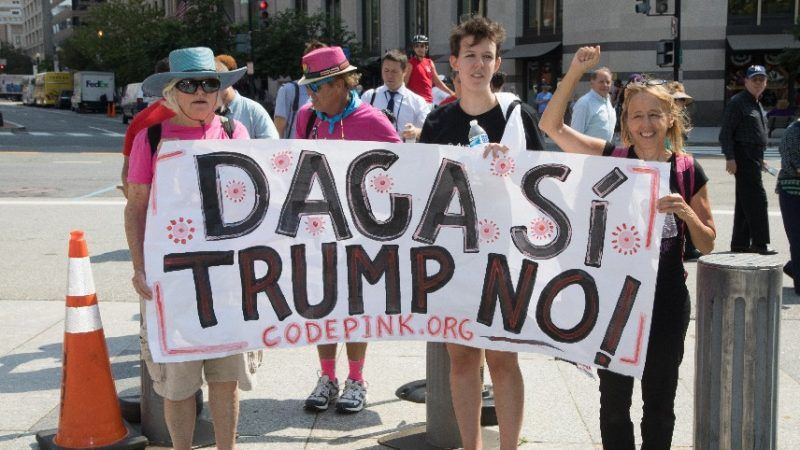DACA Immigrants Shouldn't Be Punished for Obama's Hubris
Obama was wrong to act alone, but these peaceful, educated, assimilated immigrants should be an easy sell.

When President Barack Obama pushed through Deferred Action for Childhood Arrivals (DACA) in 2012, he was wrong to have made such a dramatic change to U.S. immigration policy via executive fiat in a fit of pique (though the legality of the move is a thing about which reasonable Reasoners disagree).
At minimum, it was pretty clearly immoral for the Obama administration to collect the names of 800,000 people—to charge them $495 each every two years, even, for the privilege—in order to put their names on a list that every single person in the White House darn well knew might be used to round them up and deport them the next time a restrictionist came into power.
And lo and behold, here we are with Donald Trump casually dangling the sword of Damocles over the heads of these definitionally law-abiding residents (you're not eligible for DACA if you have committed a felony, a significant misdemeanor, or even several minor misdemeanors). He's promised to give Congress time to act, but his administration has also sent mixed messages about what enforcement looks like for DACA recipients in the meantime and has already cleared the way to use the DACA list itself to go after illegal immigrants if there's no new legislation.
But even though Obama's abuse of executive authority sucks and his willingness to imperil vulnerable immigrants in the long run for short term political gain is inexcusable, you've got admire the way he managed to gather together a cluster of humans who represent the least controversial group of immigrants you could possible imagine. Unless you are a full-scale hard-core restrictionist—that is to say, unless you think we should admit no new residents, citizens, or guest workers into the United States—you'd be awfully hard pressed to find a more politically palatable crowd the beneficiaries of DACA.
Dragged here by their parents or guardians, DACA beneficiaries are free of the original sin of illegality (for surely we are not so Old Testament as to hold children culpable for their sins of their fathers?). Because they were raised and educated in the United States—the median DACA recipient came here when she was 6 years old and attended public schools—they are already assimilated and likely proficient if not fluent in English. To be eligible for the program, applicants must have a high school degree or GED, or be currently enrolled in school.
DACA folks have all of the hallmarks of second-generation immigrants or H1-B visa recipients, where the cost-benefit analysis gets crystal clear on their payoff for the U.S. socially, economically, and culturally.
Unlike the DREAM Act, DACA contains no path to citizenship. Beneficiaries are not eligible for federal welfare or student aid payments, they can work but must have their permit renewed every two years. They cannot have been older than 16 when they entered the country (and no older than 31 in 2012) meaning that the DACA pool contains young workers with many years of tax-paying productivity ahead of them and is perfectly free of expensive sickly seniors.
In fact, could there be a recent move afoot to object to the DACA crowd because they're too good? Yesterday Andrew Kaczynski flagged this odd little vignette in which Fox's Todd Starnes and Kris Kobach complain "we had two Texas high schools were the valedictorians were [sic] illegal aliens." This kind of zero-sum thinking is also applied to the jobs the DACA beneficiaries are doing (the typical current DACA kid is now 22 and works for about $18/hour.)
To be clear, I think virtually any plan to expand the raw numbers of immigrants to the United States is good—I'll take chain migration, amnesties, quota increases, asylees, refugees, or any other way in. So I was an especially easy sell. But even congressmen far less enthusiastic than I about throwing open the golden door should be embracing DACA recipients. They are assets to the United States who don't deserve be punished for Obama's hubris and lack of foresight.
If Congress can't get it together in the next 6 months to preserve their status (and I say that with very little faith in the current Congress' ability to get it together in nearly any sense), then it may be time to concede that for now, at least, the restrictionists—or the forces of political dysfunction—have won.
For more, check me out on Tucker Carlson Tonight earlier this week:


Show Comments (247)